- Getting Started
- Field Types
- Email Notifications
-
Integrations
- MailerLite
- Create User Accounts with Convert Forms
- MailChimp
- HubSpot
- GetResponse
- AcyMailing
- Content App
- Webhooks Addon
- Facebook Meta Pixel
- Google Adwords
- Sync submissions with your favorite app
- Integrate Drip Ecommerce CRM with Convert Forms
- Google Analytics
- Constant Contact
- SalesForce Web-to-Lead
- IContact
- Zoho CRM
- Elastic Email
- Zoho Campaigns
- Zapier
- Kit
- Brevo (Sendinblue)
- Campaign Monitor
- AWeber
- ActiveCampaign
-
Functionality
- Disabling Browser Autocomplete for Form Fields
- Scroll the Page to the Top When a Long Form is Submitted
- Display Submissions Count for a Specific Form
- Populate Drop Down, Radio Buttons or Checkboxes with a CSV File
- Automatically Delete Submissions Older Than X Days
- Silently POST Submitted Data to Any API or URL
- Automatically Save Each Submission to a JSON file
- Authenticate and Login a User with a Custom Joomla Form
- Auto-Populate a Form Field with an Article Data
- Add a placeholder text to a Dropdown
- Create Multilingual Forms in Joomla
- Create a custom Joomla User Registration Form
- Redirect User to a URL After Form Submission
- Export and Import Forms across different Websites
- Export Form Submissions to CSV
- Convert Forms
- Styling and Customization
- Payment Forms
-
Advanced Features
- How to Create a Quiz Form
- Displaying a Popup After Form Submission Using EngageBox
- Conditional Content Shortcode in Convert Forms
- Copy Value From One Field to Another
- Tasks
- Export Form Submissions with a Webhook URL
- Conditional Fields
- PDF Form Submissions
- Input Masks
- Field Calculations
- Auto-Populate Form Fields Using Query String
- Use Smart Tags
- Developers
- Troubleshooting and Support
-
Spam, Security & Compliance
- Restrict Form Submissions Based on IP
- Enforcing a Custom Password Policy in Convert Forms
- Add Cloudflare Turnstile to your Joomla Form
- Implement the Iubenda Consent Database in Joomla with Convert Forms
- Add Custom Validations to Fields and Forms
- Add Math Captcha to your Form
- Prevent a Field From Saving in the Database
- Add hCaptcha to your Form
- Enable Double Opt-in
- Allow Form Submissions in Specific Date Range
- Ensure a Unique Value is Entered Into a
- Block Form Submissions Containing Profanity (Bad Words)
- Block Email Addresses or Email Domains
- Native Convert Forms Anti-spam Protection with Honeypot
- Setting Up Google reCAPTCHA
- Create GDPR Compliant Forms
Connect Convert Forms with Elastic Email
Are you interested in adding subscribers to your Elastic Email lists through your Joomla forms? Are you seeking a solution to integrate Convert Forms with Elastic Email and automate lead generation effortlessly? With the Elastic Email app for Convert Forms, you can easily subscribe users in your Elastic Email account each time someone submits your form.
This tutorial will guide you through using and configuring the Elastic Email addon in Convert Forms.
Requirements
To use the Elastic Email integration, there are a few requirements you need to meet, listed below:
- Ensure you are using Convert Forms 4.4.10-RC4+ Pro. You can easily upgrade to Pro if you're currently in the Free version
- The "Convert Forms - Apps - Elastic Email" plugin is enabled.
- Your form includes an Email field.
Setting Up Elastic Email Task
To set up the Elastic Email task and sync your submissions to the Elastic Email service, go into your form, and follow the steps listed below:
Select App
From within your form, click on Tasks > CREATE YOUR FIRST TASK.
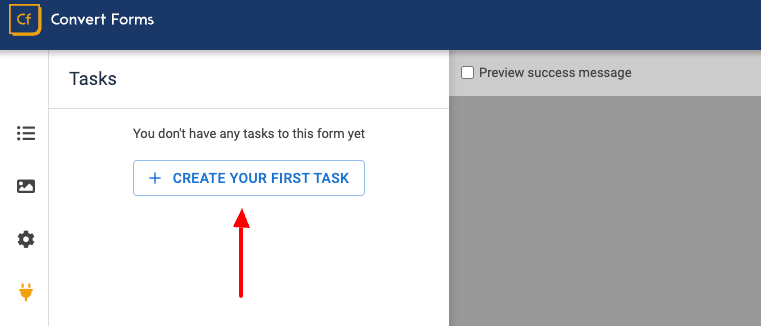
On the modal that will open, select the Elastic Email task.
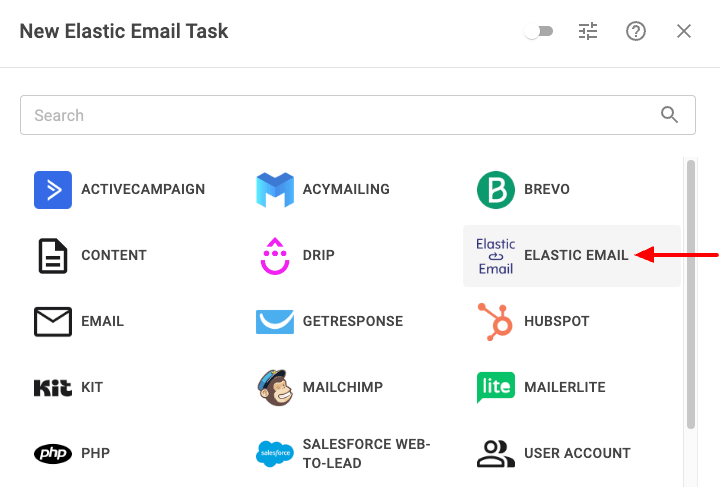
Select New Submission under Trigger and Add/Update Contact under Action on the next screen, and click CONTINUE.
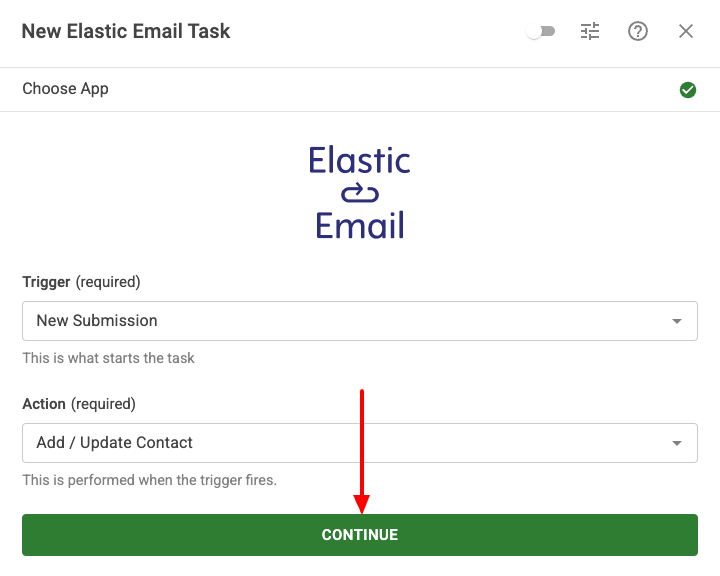
Create Connection
A connection is essential to be able to connect to a 3rd-party service, such as Elastic Email. Let's see how to create a new connection that will allow us to connect to Elastic Email.
On the next step, click SIGN IN to start creating our Elastic Email connection.
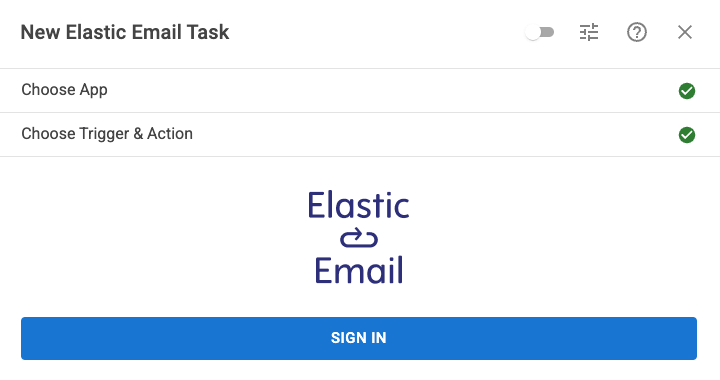
To create our connection with Elastic Email, Click ADD CONNECTION to get started.

Get your Elastic Email API Key
Before connecting to Elastic Email, we need to create a Elastic Email API Key. Follow the steps listed below to grab your API Key.
Step 1: Go to your Settings page, on your Elastic Email account by clicking here, and click on Create additional API key
Step 2: Then, enter a name, select "View & Modify" for "Account & Log in", and "Contacts", and finally click on the Generate new token button.
Step 2: On the modal that appears, type in a name for your API Key, accept the terms, and click on the Create button.
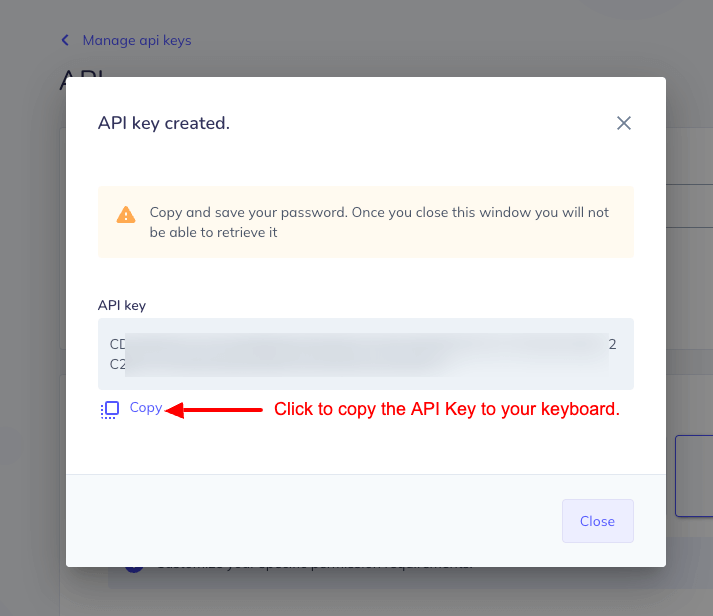
Step 3: Copy the generated API token which you will use in your Convert Forms Elastic Email Task.
Note: Store the API Key somewhere safe, as Elastic Email won't show it again for security reasons.
Now that we have created our Elastic Email API Key, we can continue setting up the connection with Elastic Email. Enter a connection name and paste your Elastic Email API Key in the fields Elastic Email Name and Elastic Email API Key, respectively. Then click ADD CONNECTION.
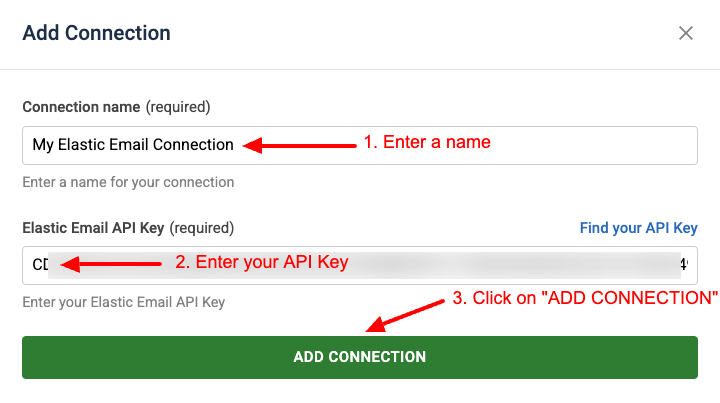
The connection has been added, and you can close the connections window.
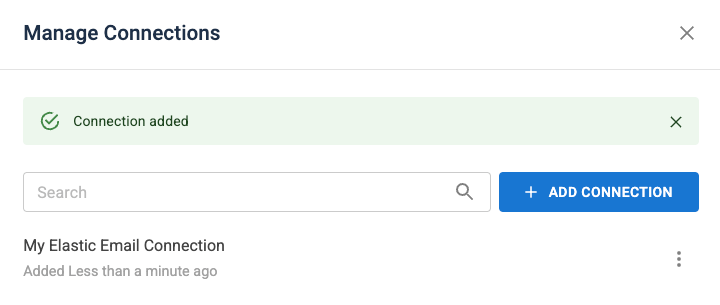
If you see the "Connection added" message, your connection with Elastic Email has been established, and you can continue with the next step. If you see any error message, please review your API Key.
Select the newly created connection from the list and click CONTINUE.
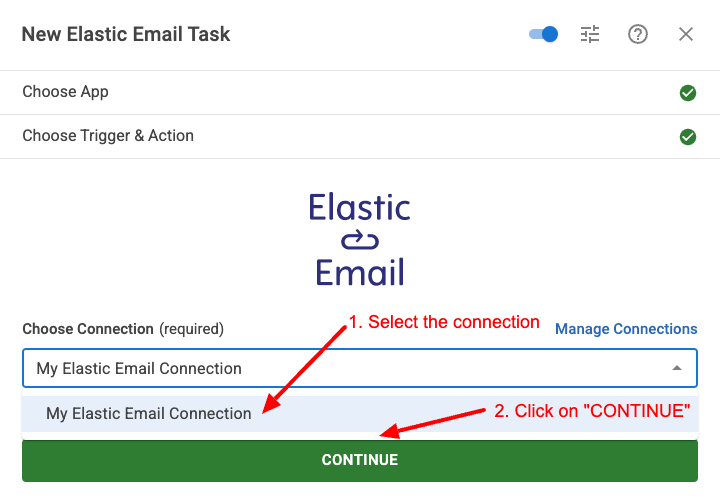
Ensure that your newly created Elastic Email connection is selected in the dropdown.
Setup Action
After you've set up the trigger, action, and connection, it's time to set up the action itself and define what information to send to Elastic Email. In this step, you can view all available settings and map each option with a fixed or dynamic value using Smart Tags.
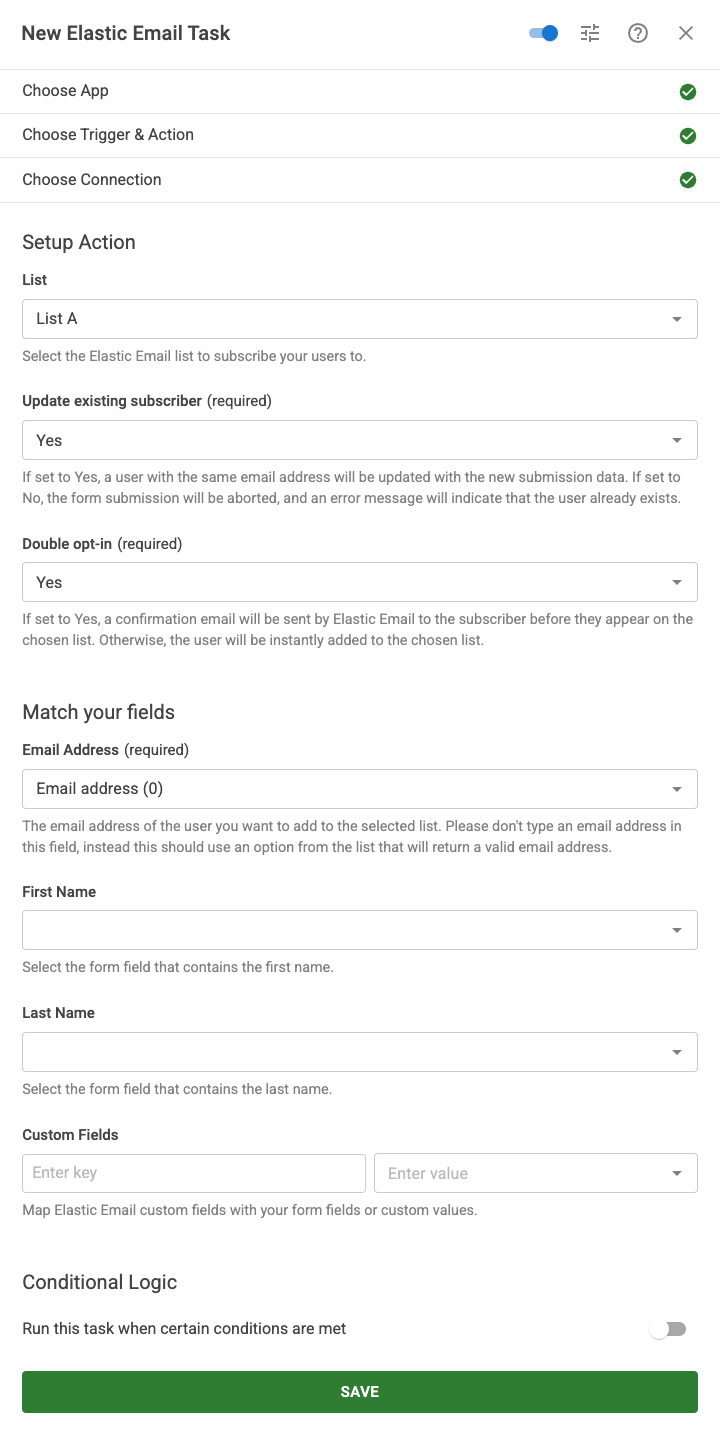
Let's see all available settings:
List
Select the list to assign the newly created contact to.
Update existing subscriber
Enable to update existing subscribers' information on your Elastic Email account. Disabling this will result in your users seeing an error message when the form is submitted, which prevents already subscribers from re-subscribing to your lists.
Double opt-in
Email Address
Select the email address of the contact. This is the user that will be subscribed to your Elastic Email list. Choose the Email field in your form.
First Name
Set the first name of the contact.
Last Name
Set the last name of the contact.
Custom Fields
Elastic Email provides custom fields, which allow you to store additional information when a subscriber is saved on your Elastic Email account, such as their name, age, company info, and more!
Add Conditional Logic
Conditional logic makes it possible to run tasks only if specific criteria are met, like a user’s email address matching a certain domain, the user being associated with a certain Joomla User Group, or a form submission having a specific value.
While editing the Elastic Email task, go to the Setup Action step and scroll down to the Conditional Logic section to set up Conditional Logic. Here's where you define all the rules the task should meet to run.
For example, let's say we need to sync submissions to Elastic Email, only if the email is coming from a specific domain: @domain.com.
- Click to enable the Run this task when certain conditions are met.
- Click Add Your First Condition.
- Select the Email field in the Trigger dropdown.
- Select Contains in the Operator dropdown.
- Enter @domain.com in the value. Replace this with your domain name.
The condition should look like this:
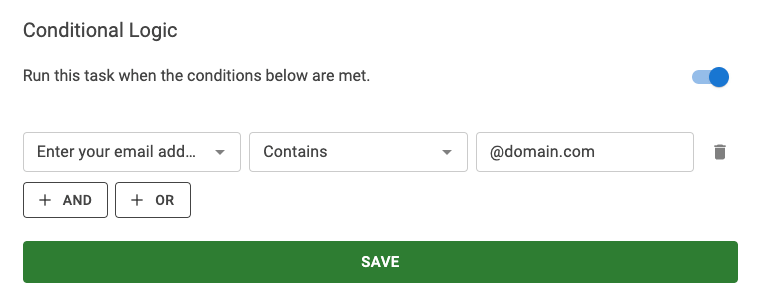
You can read more on Conditional Logic on the Working with Tasks documentation page.
Activate Task
The final step is to enable our task. To do so, click the toggle on the dialog’s top right corner, as shown in the screenshot below.

Finally, click Save to save the task, close the dialog, and then click Save from the top right corner of the form builder to save the changes on the form.
Congratulations! You’ve successfully created a form that syncs new submissions to the Elastic Email email marketing service!


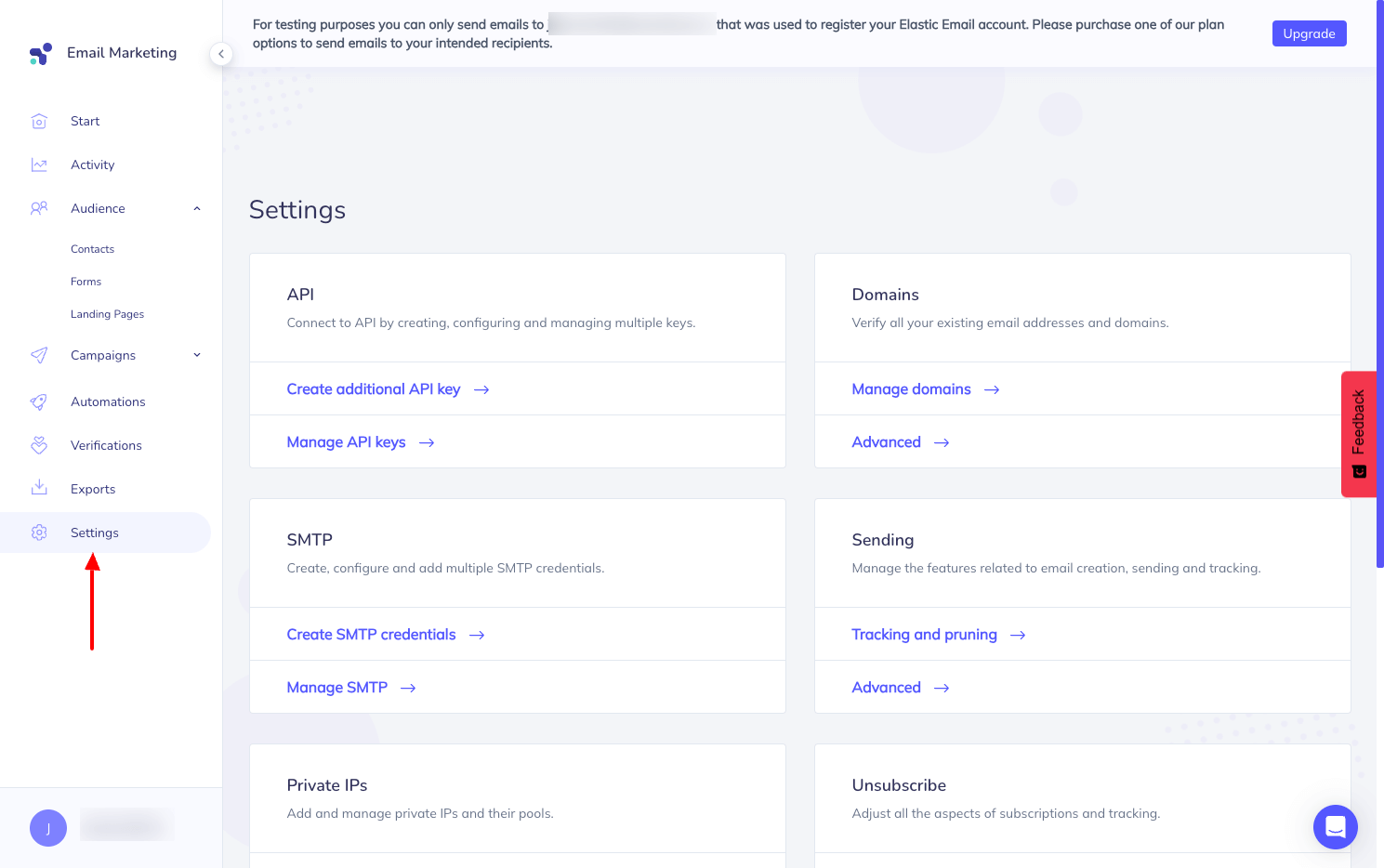
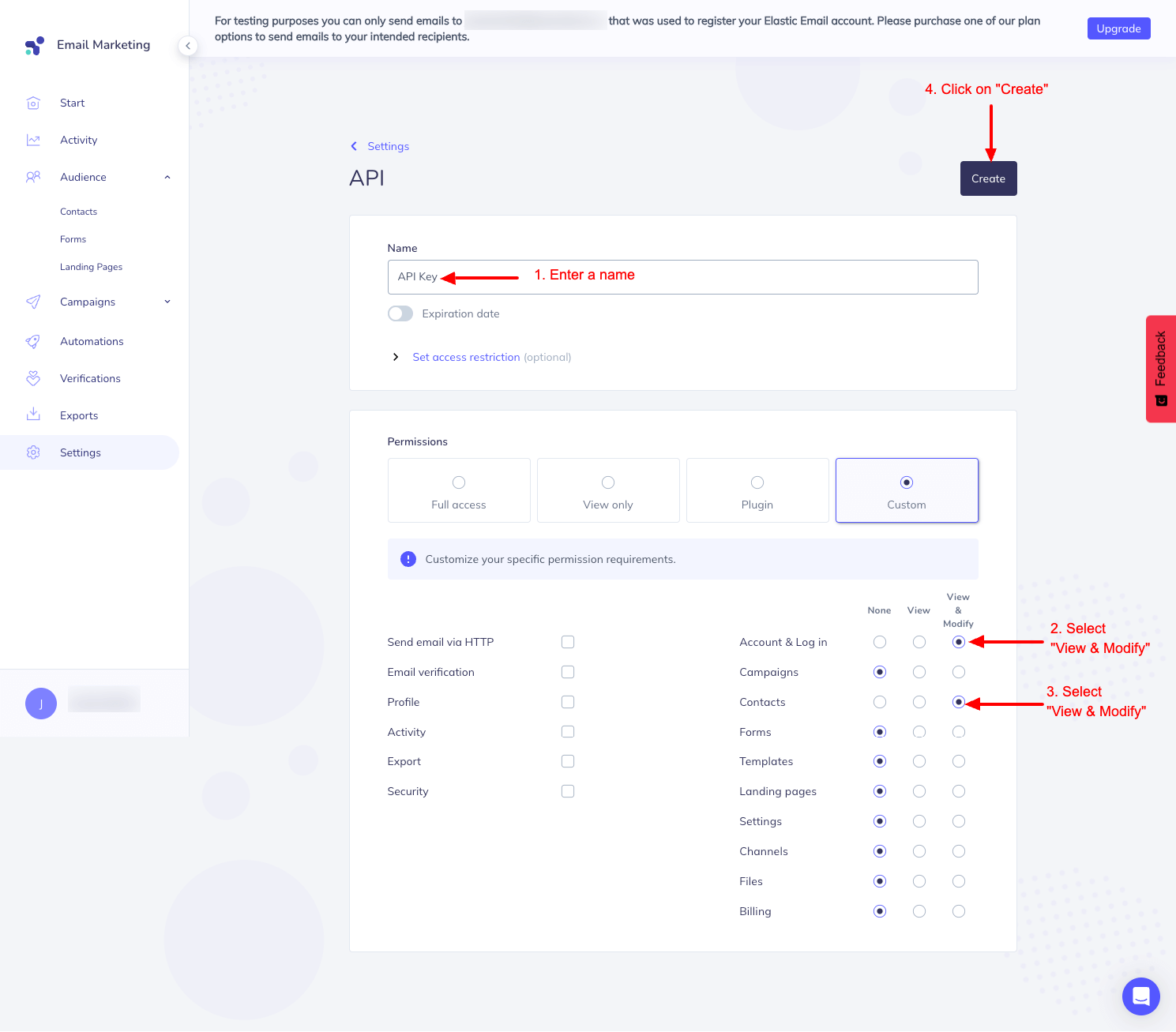





 Rated:
Rated: 